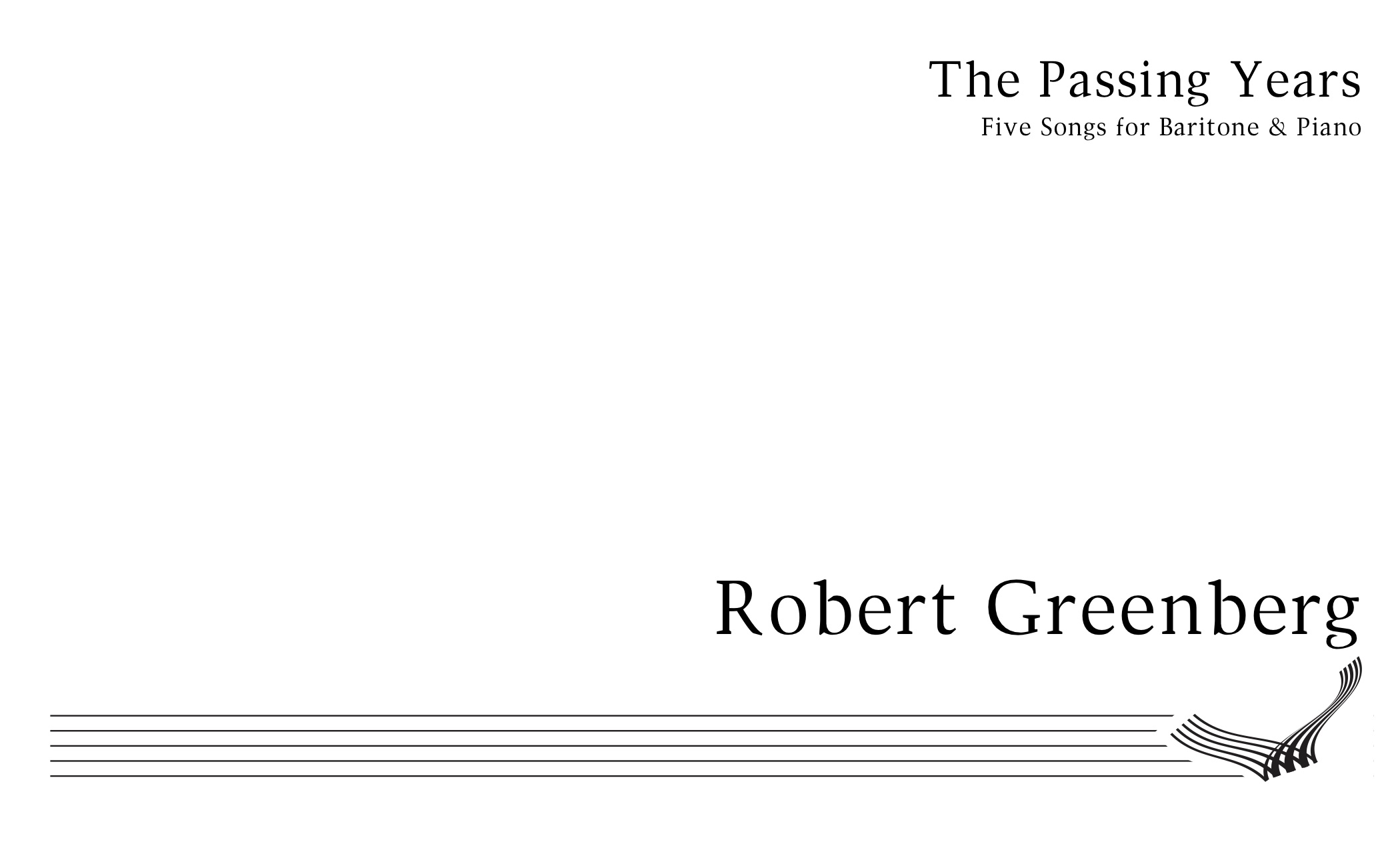The Details
for Baritone and Piano (1989) (ca. 17’)
- God Gave Me, Eliezer Greenberg
- East Broadway, Mani Leib
- The Passing Years, Reuben Eisland
- IV. Rabbi Elimelech, traditional
- At My Wedding, Jacob Isaac Segal
“The Passing Years” is a cycle of five songs for baritone and piano, completed in June, 1989. The texts were written by immigrant Jewish poets around the turn of the century. The poems reflect, in varying degrees, emotions universal to the immigrant groups which have so shaped American culture – feelings of vitality and hope for the future, spiritual strength in the face of poverty and back-breaking work, nostalgia for a world left behind, and a love for traditions as-of- yet unsullied by assimilation.
These songs were written to celebrate the poets and their poems, and the masculine, pioneer spirit they embody. Eliezer Greenberg (no relation to the composer) was born in Bessarabia, Romania in 1897 and emigrated to the United States in 1913; Mani Leib (pen-name of Mani Leib Brahinsky) was born in 1884 in Ukraine and emigrated in 1905; Reuben Eisland was born in Galicia (an area which today straddles Poland and Ukraine) in 1884 and emigrated in 1903; Jacob Isaac Segal was born in Solobkovtsy in Ukraine in 1896 and emigrated to Canada in 1911. The text of “Rabbi Elimelech” was drawn from a traditional Chassidic song called a “nigun” – an ecstatic religious song which would be danced to during the course of a prayer service. (The original melody to “Rabbi Elimelech” can be heard in the gaps between the stanzas of the poem.)
All these poems were written in Yiddish, a language, like English, with a huge vocabulary drawn from various other languages and capable of a tremendous degree of expressive nuance. Though heard in English translation, the poems still project the spirit and energy of the originals. Unlike English, Yiddish is today a language on the verge of extinction. Indeed, the “old world” nostalgically invoked by these poems has entirely ceased to be, having passed, with the years, into memory.
I. God Gave Me, Eliezer Greenberg (born 1896 in Lipkon, Bessarabia – died 1977 in New York)
God gave me
A pair of hands like sledge hammers,
And broad shoulders:
So I carry good naturedly the burden of life,
As an elephant does a fly on his neck.
And I bless him for it every day.
But a childlike heart
God also gave me,
That trembles like a harp
At the least stir of wind,
And at any lovely woman’s glance
Is caught in the net of love,
Where it struggles like a helpless bird.
And for this I bless God
Ten times a day!
II. East Broadway, Mani Leib (born 1883 in Nížyn, Ukraine – died 1953 in New York)
Of all rich streets,
Most dear to me is my shabby,
Jewish East Broadway.
Graying houses; two uneven rows:
Frail, restless and exhausted bodies:
Their worry tinged with God’s own fire –
It barely glows, yet it does not die.
And on the corners, seers and rebels
Who shout a nation’s woe unto the sky.
And the poets. O, rhapsodic brothers!
On the grime of each street
You transmute a nation’s heart – finely –
Into the strains of a new hymnal.
Long after you each stone will join you people
In the prayer of your song.
III. The Passing Years, Reuben Eisland (born 1884 in Radomyśl Wielki, Western Galicia – died 1955 in Miami Beach)
I wish I were already old.
I would get myself a heavy staff,
And buy a snuffbox too,
And I’d sit on my front step and laugh
Seeing the people rush by hurriedly,
As if they had no time to stay,
Hurry, hurry all the day.
Or maybe I would just go
Through the streets, calm and slow,
With a smooth face,
Marveling at the unruffled pace
With which over the stones
I move my old bones
Step by step,
Step by step.
IV. Rabbi Elimelech, traditional
When Rabbi Elimelech became very merry
Became very merry Elimelech,
Off he took his jacket, shoved his cap upon his head
And called for his fiddlers two.
Then the fiddling fiddlers
Fiddled very fiddingly,
Fiddled very fiddingly,
Did they.
When Rabbi Elimelech became very merry,
Became very merry Elimelech
Off he took his Talus, he polished his glasses,
And sent for his drummers two.
Then the drumming drummers
Drummed very drummingly,
Drummed very drummingly,
Did they.
And when Rabbi Elimelech became very, very merry
Became very, very, very merry Elimelech,
He made the Sabbath prayer with his Shamas Naftali,
And sent for his cymbal players two.
Then the cymb’ling cymbalists
Cymballed cymballically,
Cymballed cymballically,
Did they!
They did!
V. At My Wedding, Jacob Isaac Segal (born 1894, Solobkovtsy, Ukraine – died 1954, Montreal)
At my wedding a red haired madman
Fiddled on the smallest, gentlest little fiddle;
He played his sweet lament and fabled song
While other fiddlers watched in dumb amazement.
Where did he learn it, this red haired simpleton?
When you consider that he lived and worked
In backwards villages
And played only at drunken gentile brawls.
If you can picture it,
He could hardly scratch together
A handful of holy words,
Not even to save himself.
As for sleeping,
He bedded on a wooden bench,
And if a servant gave him radishes ffrom the master’s garden.
He was fed.
It was at my wedding this poor devil played,
No one could stand still yet all were rooted:
Ears in the air like pointed spears,
While the little fiddler tenderly caressed
And fiercely scored the people,
Tore them to bits,
Flayed them and drew blood from all their veins,
Until stretched as tight as violin strings,
The old folk, quivering,
Cried out, cried out for mercy.
All poems used by permission
Translations R. M. Greenberg





